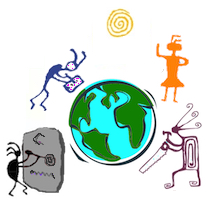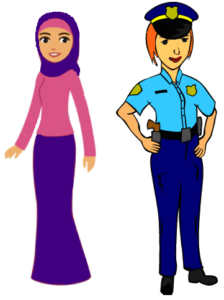Years ago, I got a job out of the blue – an employee at a nonprofit had to be dismissed quickly and a replacement was needed immediately. There was no time for a usual recruitment process that included interviewing of several people – someone said I would be a good candidate and could start immediately, I got a call asking if I was interested, I got interviewed, I got the job and I began working – all within the span of maybe a week.
Months later, I found out that the Executive Director had not been happy at first when I was hired because she didn’t like how I dressed and, therefore, thought I wasn’t good at my job – which involved IT, and not any in-person interaction with the public or the high-profile Silicon Valley partners she collaborated with regularly. The office was very corporate: men in suits, women in business dress. I, on the other hand, was Silicon Valley casual long before it was the norm: I was neat, clean and quite presentable, but in comfortable clothes (I was very fond of flowy dresses and skirts in those days) and comfy shoes (never sandals, but also, never heels). She also didn’t like my hair: it’s clean, but it’s kind of all over the place a lot of time – unless I wear a head covering or cake it in product, that’s just how it is. However, she was very pleased with me once she saw my work and heard from my colleagues about my job performance. She ended up being a very enthusiastic professional reference for me for many years. But she said at one point to a colleague later, “I need to work on my assumptions about people based on how they dress.”
After hearing about that comment and spending a few days of feeling like I didn’t look very nice (I got over it), I ended up really appreciating that remark, because it meant I was being judged by the content of my work and my character, that she was learning that people who weren’t completely corporate could be more than competent and that she was willing to change her mind, something I always admire in people. But I’ve taken her comment to heart in my own interviews of candidates, not just with employees, but with volunteers as well. And not just about how people dress.
I know a lot of people who talk about the importance of “trusting your gut” when screening volunteers. But what if your gut is prejudiced? Let’s face it: we ALL have unconscious biases, at the very least, and if we aren’t constantly looking for those, and looking for ways to eliminate the possibility of them creeping into our decision-making, we’re going to miss out on some great volunteering candidates.
Unconscious bias can show up when we see and judge someone’s weight, or a certain brand of clothing they are wearing, or a hairstyle or hair color they are sporting. Or perhaps we’re judging them negatively because of hair loss. Or because of wrinkles on their face. Or perceived age. Or physical features. Or a regional accent.
It’s important to always be thinking about why you are saying no to a candidate for employment or volunteering, and having reasons that you feel confident in writing down on an evaluation sheet – and, potentially, having such read aloud in a civil suit.
Remember that just because someone doesn’t look like you or doesn’t look like someone you would socialize with, it shouldn’t exclude them from being a volunteer.
And on a side note: your program can certainly let applicants know, in your role description, that you have a dress code. But remember that there needs to be a rational basis for each dress code requirement, it must be applied in a consistent fashion, it should not obviously discriminate on the basis of race, sex, religion and ethnicity and it should not overburden a particular group. For instance, requiring clean hands, faces and hair, and prohibiting shirts or pants with any words or graphics, prohibiting clothing that exposes legs above the knee or even the ankle, prohibiting torn clothes, prohibiting sandals, etc., can all be justified regarding safety and maintaining a neutral, positive image and culture in the workplace. Requiring people’s hair to be off the shoulders or even covered altogether for safety reasons can be appropriate, but having one rule for men and another for women can get you into legal trouble. And note the many reasons that the US Army had to change its hair policies for women.
If your reaction to all this is “I have no unconscious biases regarding people,” I would like to remind you that denial is not just a river in Egypt.
Today is Martin Luther Kind, Jr. Day in the USA – an excellent day to own up to the reality that we all have unconscious biases that we should all work on, as well as that there are profound social inequities in the world that are long overdue to be addressed.
Also see:
- Volunteer managers: you are NOT psychic!
- People with disabilities & virtual volunteering
- You do not need to meet via video conference with every potential volunteer
- Screening Volunteers for Attitude
- Why & how to make volunteering as accessible as possible
- More: systemic racism in volunteer engagement
- Systemic exclusion, including systemic racism, in volunteer management

If you have benefited from this blog, my other blogs, or other parts of my web site and would like to support the time that went into researching information, developing material, preparing articles, updating pages, etc. (I receive no funding for this work), here is how you can help.



